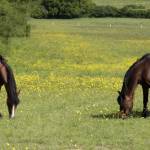Tips for Healthy Spring Grazing

Even the healthiest of horses may encounter digestive disturbances associated with fast-growing grasses and overconsumption. Overweight horses and ponies with insulin resistance are particularly susceptible to high-fructan grasses. The amount of fermentable carbohydrates, including fructans, in lush pasture often overwhelms the gastrointestinal tract, escaping digestion in the small intestine and passing to the hindgut. These carbohydrates or sugars are then processed in the hindgut, setting the stage for hindgut acidosis and potentially resulting in laminitis and colic.
EquiShure, a research-proven time-released buffer, helps moderate the hindgut by supporting the residential microbial population and preventing the drastic drop in pH associated with acidosis.
Choose EquiShure to reduce the risk of hindgut acidosis escalating to laminitis in horses grazing high-fructan pastures or receiving significant intakes of starch-laden grains, including those at risk for or with a history of laminitis.
Horse owners can also restrict free grazing during times when fructan levels are likely to be elevated, beginning with several short grazing sessions each day and gradually increasing length and number. Using a grazing muzzle to slow grass consumption, keeping the horse in a drylot for part of the day, and continuing to offer hay in addition to pasture are additional ways to provide more dry matter and limit the intake of fructans.
Wondering which feed or supplements are right for your horse? Share a few details and a nutrition advisor will be in touch.
Read more:
- Turnout Tips: When’s Best to Graze?
- The Hindgut: Understanding Its Role in Equine Digestive Health
- Muzzle It: Correct Fit of Grazing Muzzles on Horses








